
Belgium, officially the Kingdom of Belgium, is a country in Western Europe. It is bordered by the Netherlands to the north, Germany to the east, Luxembourg to the southeast, France to the southwest, and the North Sea to the northwest. It covers an area of 30,689 km2 (11,849 sq mi) and has a population of more than 11.5 million, making it the 22nd most densely populated country in the world and the 6th most densely populated country in Europe, with a density of 376 per square kilometre (970/sq mi). The capital and largest city is Brussels; other major cities are Antwerp, Ghent, Charleroi, Liège, Bruges, Namur, and Leuven.

Brussels, officially the Brussels-Capital Region, is a region of Belgium comprising 19 municipalities, including the City of Brussels, which is the capital of Belgium. The Brussels-Capital Region is located in the central portion of the country and is a part of both the French Community of Belgium and the Flemish Community, but is separate from the Flemish Region and the Walloon Region. Brussels is the most densely populated and the richest region in Belgium in terms of GDP per capita. It covers 162 km2 (63 sq mi), a relatively small area compared to the two other regions, and has a population of over 1.2 million. The five times larger metropolitan area of Brussels comprises over 2.5 million people, which makes it the largest in Belgium. It is also part of a large conurbation extending towards Ghent, Antwerp, Leuven and Walloon Brabant, home to over 5 million people.

Leopold III was King of the Belgians from 1934 until 1951. On the outbreak of World War II, Leopold tried to maintain Belgian neutrality, but after the German invasion in May 1940, he surrendered his country, earning him much hostility, both at home and abroad.

Leuven or Louvain is the capital and largest city of the province of Flemish Brabant in the Flemish Region of Belgium. It is located about 25 kilometres east of Brussels. The municipality itself comprises the historic city and the former neighbouring municipalities of Heverlee, Kessel-Lo, a part of Korbeek-Lo, Wilsele and Wijgmaal. It is the eighth largest city in Belgium with more than 100,244 inhabitants.
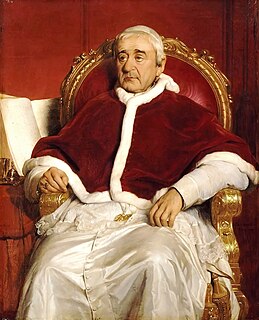
The Catholic University of Leuven or Louvain was founded in 1834 in Mechelen as the Catholic University of Belgium, and moved its seat to the town of Leuven in 1835, changing its name to Catholic University of Leuven. In 1968 it was split into two universities, the Katholieke Universiteit Leuven and the Université catholique de Louvain, following tensions between the Dutch and French-speaking student bodies.

Brussels Airport is an international airport 6.5 NM northeast of Brussels, the capital of Belgium. In 2019, more than 26 million passengers arrived or departed at Brussels Airport, making it the 24th busiest airport in Europe. It is located in the municipality of Zaventem in the Province of Flemish Brabant in the Flemish Region of Belgium. It is home to around 260 companies, together directly employing 20,000 people and serves as the home base for Brussels Airlines and TUI fly Belgium.

The Université catholique de Louvain is Belgium's largest French-speaking university. It is located in Louvain-la-Neuve, which was expressly built to house the university, and Brussels, Charleroi, Mons, Tournai and Namur. Since September 2018, the university has used the branding UCLouvain, replacing the acronym UCL, following a merger with Saint-Louis University, Brussels.
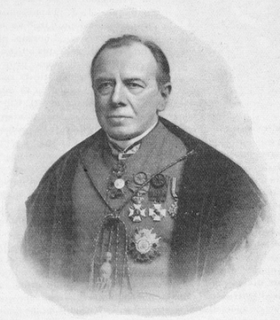
Jean Baptiste Abbeloos was a Belgian orientalist and Rector of the University of Leuven.
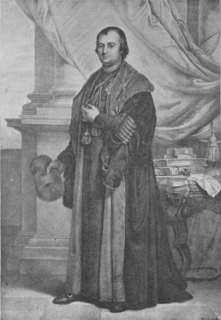
Pierre François Xavier de Ram, was a Belgian papal prelate, canon and historian, best known for being the first rector of the new Catholic University of Belgium, founded in Mechelen in 1834, which in 1835 moved to Leuven as the Catholic University of Leuven.
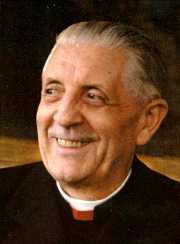
Leo Jozef Suenens was a Belgian prelate of the Roman Catholic Church. He served as Archbishop of Mechelen-Brussels from 1961 to 1979, and was elevated to the cardinalate in 1962.

Charles De Smedt S.J. was a Belgian Jesuit priest and hagiographer. He was a Bollandist, and is noted for having introduced critical historical methods into Catholic hagiography, so that it became a collection of accounts of the accretion of legends, as well as the compilation of original materials.

The Pontifical French Seminary is a Roman College dedicated to training French speaking Roman Catholic priests.
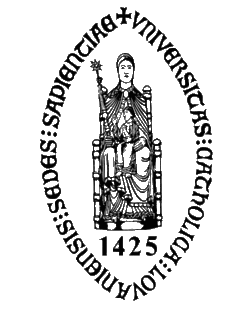
The Leuven Faculty of Theology was a branch of the Catholic University of Leuven, founded in 1834 in Mechelen by the bishops of Belgium as the Catholic University of Belgium, that moved its seat to the town of Leuven in 1835, changing its name to Catholic University of Leuven.

KU Leuven or Katholieke Universiteit Leuven, is a research university in the city of Leuven, Belgium. It conducts teaching, research, and services in computer science, engineering, natural sciences, theology, humanities, medicine, law, canon law, business, and social sciences.
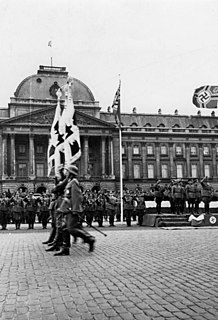
Despite being neutral at the start of World War II, Belgium and its colonial possessions found themselves at war after the country was invaded by German forces on 10 May 1940. After 18 days of fighting in which Belgian forces were pushed back into a small pocket in the north-west of the country, the Belgian military surrendered to the Germans, beginning an occupation that would endure until 1944. The surrender of 28 May was ordered by King Leopold III without the consultation of his government and sparked a political crisis after the war. Despite the capitulation, many Belgians managed to escape to the United Kingdom where they formed a government and army-in-exile on the Allied side.

Albert De Vleeschauwer, later Baron Albert De Vleeschauwer van Braekel, was a Belgian politician of the Catholic Party.
Events in the year 1940 in Belgium

The Marie Haps Faculty of Translation and Interpreting is a faculty of Saint-Louis University, Brussels (UCLouvain) located on its own campus in Brussels' European Quarter, in the municipalities of Ixelles and the City of Brussels. It is Belgium's oldest translation school, founded in 1955, and the fifth faculty of Saint-Louis University, Brussels, which it fully merged with in 2015.

Malvina Gruber nee Hofstadterova was a Jewish Comintern agent, who was part of a Soviet intelligence network in Belgium and France, that was later called the Red Orchestra by the Abwehr. Gruber worked as a cutout, but her specialism was couriering people across borders. From 1938 to 1942, Gruber worked as assistant to Soviet agent Abraham Rajchmann, a forger, who provided identity papers, e.g. the Kennkarte, Carte d'identité and travel permits, for the espionage group. At the beginning of 1942, she was arrested in Brussels by the Abwehr.


















